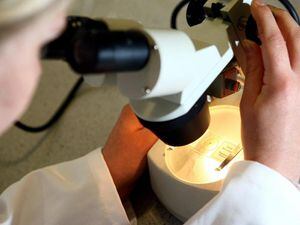Prostate cancer researchers hail ‘hugely significant finding’
Scientists found some men’s tumours had a distinct genetic pattern.

A genetic test could help doctors identify prostate cancer patients who may benefit from immunotherapy, researchers say.
Scientists found tumours in a small group of men with an advanced form of the disease had a distinctive pattern of genetic changes.
The biological features of these tumours could mean they are more likely to respond to immunotherapy drugs such as pembrolizumab, according to a study published in journal Cell.
In the future, a test could help pick out men with these genetic changes so they can be considered for the treatment, the authors said.
A major trial earlier this month showed for the first time that immunotherapy could work in men with advanced prostate cancer.
Around one in 10 of these patients did not see their cancer grow after a year on pembrolizumab, according to research presented at the American Society of Clinical Oncology annual meeting in Chicago.
The new study, by scientists at The Institute of Cancer Research in London and University of Michigan in the US, suggests a genetic test could flag those likely to respond to the treatment.
Professor Johann de Bono, of the Institute of Cancer Research, said: “Immunotherapy works for a relatively small group of men with advanced prostate cancer – but when it works, it really works.
“If we can identify in advance who will benefit, then it should accelerate the passage of immunotherapy into routine use for patients.
“Our new study has revealed a distinct group of men with advanced prostate cancer whose tumours have biological features that could make them likely to respond to immunotherapy drugs such as pembrolizumab.”
Howard Soule, chief science officer at the Prostate Cancer Foundation, which part-funded the study, said it was a “hugely significant finding”.
Researchers analysed tumour DNA from 360 men with advanced prostate cancer.
They found the tumours of 7% of these men were missing both copies of a gene called CDK12.
Tumours with this genetic profile contained a higher number of immune cells than other forms of prostate cancer, and had a higher number of protein fragments on their surface which flag tumour cells to the immune system.
Tumours with these characteristics often respond better to immunotherapy, the researchers said, possibly because the immune system had early warning of foreign cancer cells.
A small pilot study in the US found two out of four men with advanced prostate cancer whose tumours had CDK12-linked genetic changes responded well to pembrolizumab.
Professor de Bono said: “We now need larger clinical studies to further study the benefit of immunotherapy in this group of patients.
“In the future, a genetic test could help pick out men with this particular set of genetic changes, so that they can be considered for immunotherapy.”
Immunotherapy drugs work by stimulating the immune system to recognise and fight the cancer, and are already used to treat some advanced cancers, including lung and melanoma.





